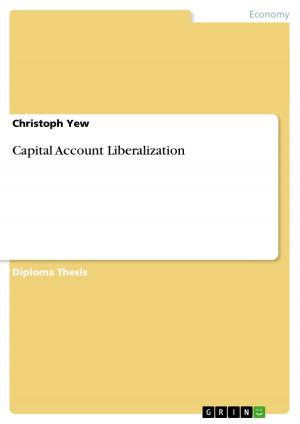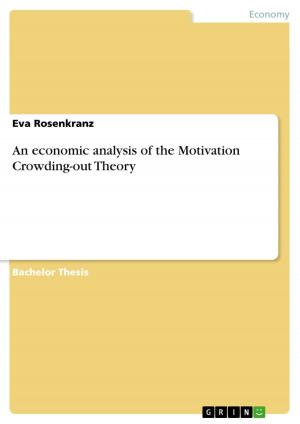Emma Lazarus' 'The New Colossus' and the Continued Controversy between Americanism and Multiculturalism
Nonfiction, Entertainment, Drama, Anthologies| Author: | Anonymous | ISBN: | 9783668259157 |
| Publisher: | GRIN Publishing | Publication: | July 13, 2016 |
| Imprint: | GRIN Publishing | Language: | English |
| Author: | Anonymous |
| ISBN: | 9783668259157 |
| Publisher: | GRIN Publishing |
| Publication: | July 13, 2016 |
| Imprint: | GRIN Publishing |
| Language: | English |
Seminar paper from the year 2014 in the subject American Studies - Literature, University of Passau, language: English, abstract: Beginning with the interpretation and analysis of one of America's probably most- cited and most well- known sonnets 'The New Colossus' (1903) by Emma Lazarus, I will continue to explain its symbolic meaning throughout the 20th century until today and its significance in creating a commonly accepted national identity. After briefly outlining the history of the different waves of immigrants between the early 19th century and the beginning of World War I that took on the hardships of several weeks of oversea travel to find their very own pursuit of happiness in the 'New World', and also the ones coming mostly from South and Middle America in the 21st century, I will show that the 'nation of immigrants' has also always been a nation of nativists. As an example of the once widespread belief in the supremacy of the white race and the predominance of Anglo- Protestant culture, I will compare and contrast Thomas Bailey Aldrichs's poem 'Unguarded Gates' (1895) to the opposing ideal of freedom, equality and openness that is proposed not only by Lazarus' work, but also repeatedly emphasized in manifestations of the American Creed, such as the National Anthem or the Pledge of Allegiance. Following Samuel P. Huntington's question in 'Who are we? The Challenges to America's National Identity' (2004), I will then try to outline the phase of immigrants' assimilation, as pictured by the Melting Pot metaphor, which was at that time challenged by the 'tomato soup' allegory and later replaced by the rising popularity of multiculturalism and the predominance of subnational identities over one's national identity, best illustrated by the metaphor of a salad bowl. The shock of September 11th however, again brought nationalist and patriotic feelings to the fore, causing not only a massive rise in restrictive immigration policies, such as the Patriot Act of 2002 or the Security Fence Act of 2006, but also raising questions concerning America's future: will we see complete and thorough 'hispanization', the re-conquering of the state by Anglo- Protestant movements or rather the emergence of a bilingual society with two different cultures coexisting within one country? Is it even possible for America today to share a common national identity with only one language and only one dominant culture, while society is made up of so many different cultural sources?
Seminar paper from the year 2014 in the subject American Studies - Literature, University of Passau, language: English, abstract: Beginning with the interpretation and analysis of one of America's probably most- cited and most well- known sonnets 'The New Colossus' (1903) by Emma Lazarus, I will continue to explain its symbolic meaning throughout the 20th century until today and its significance in creating a commonly accepted national identity. After briefly outlining the history of the different waves of immigrants between the early 19th century and the beginning of World War I that took on the hardships of several weeks of oversea travel to find their very own pursuit of happiness in the 'New World', and also the ones coming mostly from South and Middle America in the 21st century, I will show that the 'nation of immigrants' has also always been a nation of nativists. As an example of the once widespread belief in the supremacy of the white race and the predominance of Anglo- Protestant culture, I will compare and contrast Thomas Bailey Aldrichs's poem 'Unguarded Gates' (1895) to the opposing ideal of freedom, equality and openness that is proposed not only by Lazarus' work, but also repeatedly emphasized in manifestations of the American Creed, such as the National Anthem or the Pledge of Allegiance. Following Samuel P. Huntington's question in 'Who are we? The Challenges to America's National Identity' (2004), I will then try to outline the phase of immigrants' assimilation, as pictured by the Melting Pot metaphor, which was at that time challenged by the 'tomato soup' allegory and later replaced by the rising popularity of multiculturalism and the predominance of subnational identities over one's national identity, best illustrated by the metaphor of a salad bowl. The shock of September 11th however, again brought nationalist and patriotic feelings to the fore, causing not only a massive rise in restrictive immigration policies, such as the Patriot Act of 2002 or the Security Fence Act of 2006, but also raising questions concerning America's future: will we see complete and thorough 'hispanization', the re-conquering of the state by Anglo- Protestant movements or rather the emergence of a bilingual society with two different cultures coexisting within one country? Is it even possible for America today to share a common national identity with only one language and only one dominant culture, while society is made up of so many different cultural sources?















